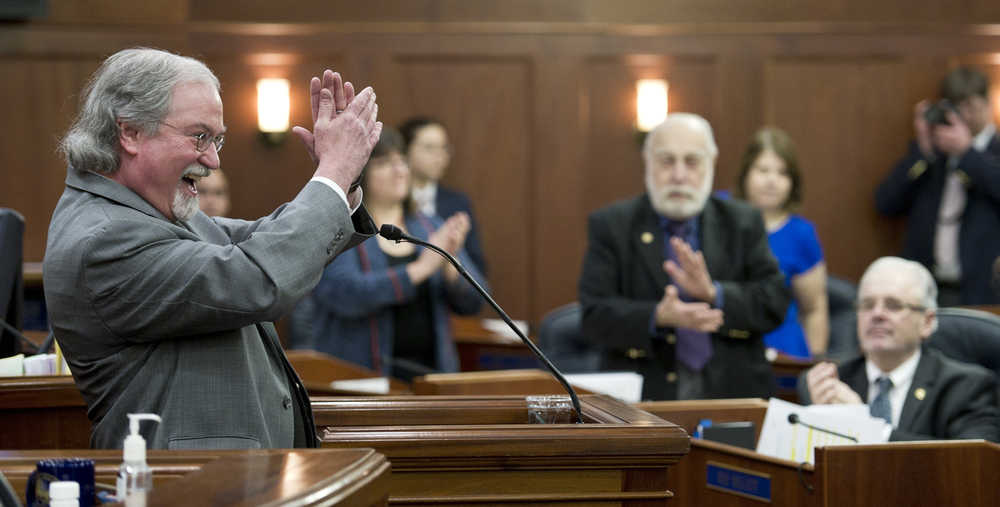Alaska’s court system will operate on half days every Friday starting July 1, Supreme Court Justice Craig Stowers told the Alaska Legislature on Wednesday.
In the annual State of the Judiciary address given by the chief justice to the Legislature, Stowers touted the cost-cutting measures the court system has already undertaken and unveiled his plans for the next fiscal year.
Under Article 4, Section 16 of the Alaska Constitution, the chief justice is the administrative head of the Alaska court system, overseeing its $112.7 million budget and about 800 employees.
There are fewer of those employees than there once were. Since July 1, the court system has enacted what Stowers called a “hiring freeze,” refusing to fill vacancies left open by retirement. Thirty-five positions have been cut through this process of attrition so far, and the court system expects another 17 more by June 30.
The court system’s administrative employees and judges have taken voluntary days off without pay. “It’s astonishing to all of us, and the court system is very proud of all these people,” Stowers said, a remark that garnered applause from the legislators assembled in the chambers of the House of Representatives.
Despite a cut of $3.4 million this fiscal year, Stowers said he expects another $3.8 million to be sliced from the court system budget in the next fiscal year, which begins July 1.
“That might not sound like a lot in the grand scheme of things,” Stowers said, referring to the state’s $3.7 billion annual deficit, but it’s a substantial fraction of the court system’s budget.
In addition to working half-days on Fridays, the court system will reduce its operations in other ways. Electronic documents are replacing paper ones, saving hundreds of thousands of dollars. Videoconferenced court appearances are replacing the need to fly litigants to remote courtrooms.
“This is a new budget reality for all of us, and we all are going to have to do what it takes to meet the budget targets that you give us,” Stowers told legislators.
He said that some lawmakers have urged him to close some of the state’s smaller courthouses, which are located in rural areas.
“I don’t want to do that,” Stowers said. “The court system doesn’t want to do that. In many of these communities, the court system is the face of the state of Alaska.”
While a rural town or village might have a courthouse, it may not have a police force or other government agency.
“It would be a terrible travesty” if that went away, he said. “For today and next year, these more draconian strategies are not necessary.”
At times quoting Winston Churchill and Frank Herbert’s science-fiction novel “Dune,” Stowers said lawmakers “are our leaders today, and we Alaskans need your leadership … as never before in our history.”
He urged lawmakers to act rationally, with “wisdom and good faith and courage,” and to avoid fear.
“Fear is the mind-killer,” he said.
After the address, Rep. Cathy Muñoz, R-Juneau, said she thinks the court system’s cost-cutting efforts set an example for other state departments to follow.
“I like the strategy the court system has utilized,” she said. “I appreciate the all-hands-on-deck approach.”
Muñoz is chairwoman of the House subcommittee in charge of the judiciary’s budget and has been working on the court system budget for months. She said Stowers’ address didn’t present information that’s new to her, but it was interesting that it focused on budget issues.
“In the past, the addresses have focused more on policy and criminal justice and reform efforts,” she said.
Rep. Sam Kito III, D-Juneau, thought Stowers “did a great job” in his address.
He appreciates that the court system is offering budget cuts, but is concerned about the pressures forcing a “critical organization” to cut.
“We could very well end up with court cases taking a lot longer to process,” he said.
Sen. Dennis Egan, D-Juneau, said he’s worried about the same thing, but “I appreciated him talking about the fiscal crisis the court system has.”
“I think some of his message is we all have to step up to the plate and make difficult decisions, no matter how unpopular they are,” Egan said.

